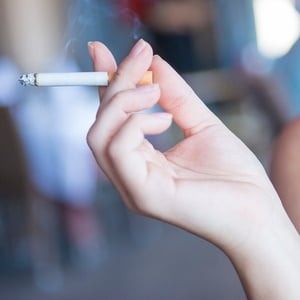
Well, good effort, but sorry, still no cigar. Because now there's a new baddie to contend with: third-hand smoke.
The smoker's ghostly imprint
There is no safe level of cigarette smoke, as the U.S. Surgeon General has famously stated. And that includes the tobacco toxins, invisible but malign, that continue to haunt the environment some time after a cigarette has been stubbed out.
While second-hand smoke is smoke you inhale from the polluted clouds that emanate from someone actively smoking, "third-hand smoke" is the catchphrase for contaminants that smokers leave in their wake. Both second-hand and third-hand smoke are included in the term "environmental tobacco smoke", or ETS for short.
Third-hand smoke is that tell-tale, stale whiff that clings to a smoker's hair and clothes when they've come back inside from a smoke, conscientiously performed round the corner or craning out of the window.
And it isn't just a bad smell; the smell itself is poison.
Melodramatic? Not really. Smell, let's not forget, makes use of chemical stimuli: if you can smell a substance it's because an actual molecule of that substance has detached itself, travelled through the air and entered your nasal passages.
Third-hand smoke is also the smoking fallout you can't smell: tiny toxic particles that drift through the air, settle on surfaces and collect in dusty corners.
What the research says
Before you write off third-hand smoke as yet another ruse by the anti-tobacco lobby to further persecute the poor beleaguered smokers, consider some of the work that's been done on the concept, which, although still relatively new to the lay public, has been knocking around for a few years already in medical science.
A 2004 study, for example, looked at the homes of smokers with infants. Specifically, the researchers examined toxin levels in the air and dust, and on the surfaces, of these households. These were smokers of the New Enlightened brand: they took care to only smoke outdoors.
The study found that ETS contamination and exposure levels were indeed reduced in these households compared to those of smokers still puffing wantonly indoors, but the New Enlightened Smokers' households still had levels 5-7 times higher than those of non-smokers.
In other words, smoking outside the home and away from your baby reduces, but does not completely protect, your home from ETS contamination and your baby from ETS exposure.
The reason such studies have focused primarily on kids isn't mere sentiment. Babies and children aren't just short adults when it comes to environmental toxin exposure: they get hit harder.
They spend more time closer to the ground where the dust gathers, for one thing, and they're more likely to put grubby hands in their mouths. Also, their faster metabolism and growth means that they take in more toxins proprotionately than adults do, and their developing bodies are more vulnerable to the ill effects.
Do scientists have a clear idea of how dangerous exposure to third-hand smoke toxins might be? No, they don't, which doesn't mean these relatively low levels might not increase risk for associated health problems. The negative health effects of second-hand smoke, which also contains "low" levels of toxins relative to direct smoking, are now well-established. And studies have shown a link between very low levels of tobacco toxins and childhood developmental problems, for example.
Aren't there hundreds of toxins in the environment anyway? Yes, there are, which is all the more reason to reduce the chemical load however we can.
Implications for the smoker/non-smoker divide
So what should the pure-of-lung do with this information? Never let smokers darken your doorway again? Insist they strip and hose themselves down in the garden before they cross the threshold? Forbid your children from consorting with their offspring for fear of contamination?
Entertaining though such scenarios may be, they aren't particularly realistic or likely to win converts over from the Dark Side of the Divide at this stage. It's still too early: most of us, even the non-smokers, have only just heard about third-hand smoke.
Instead, consolidate your position as regards second-hand smoke (remember how people denied its existence too at first):
- Don't compromise on keeping your home smoke-free, and don't apologise about it. Those days are long over.
- Start asking smokers, when they take smoke breaks outside, to stand away from the doors and windows. This is not unreasonable: second-hand smoke creeps back in through these openings, and because of this legislation is in the works to make it an offence to smoke directly outside the entrance to a public building - in future smokers will need to stand a few metres away.
As for the smokers... Well, I could say all kinds of preachy odious things like "think third-hand next time you hold a baby", but I won't because it'll only lead to defensiveness and resentment.
Rather let me gently encourage you think of third-hand smoke as the newest item on the list of the many, many, many incentives you already have to give up. Come on. It's past time.
- (Olivia Rose-Innes, EnviroHealth Editor, Health24, February 2008)
Sources:
- Matt GE, Quintana PJ, Hovell MF, et al. Households contaminated by environmental tobacco smoke: sources of infant exposures. Tobacco Control. 2004;13 (1):29 –37
- US Department of Health and Human Services. The Health Consequences of Involuntary Exposure to Tobacco Smoke: A Report of the Surgeon General. Washington, DC: US Department of Health and Human Services, Centers for Disease Control and Prevention, Coordinating Center for Health Promotion, National Center for Chronic Disease Prevention and Health Promotion, Office on Smoking and Health; 2006
- Winickoff JP et al. Beliefs About the Health Effects of "Thirdhand" Smoke and Home Smoking Bans. Pediatrics Vol. 123 No. 1 January 2009, pp. e74-e79 (doi:10.1542/peds.2008-2184)




 Publications
Publications
 Partners
Partners











